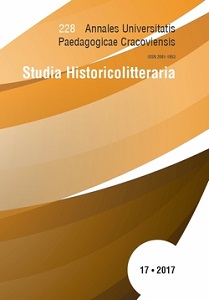Telewizyjne gry z Pirandellem
Televisions Play with Pirandello
Author(s): Ewa ŁubieniewskaSubject(s): Theatre, Dance, Performing Arts, Post-War period (1950 - 1989), History of Art
Published by: Wydawnictwo Uniwersytetu Komisji Edukacji Narodowej w Krakowie
Keywords: innovation; myth; reception; truth; illusion; mask; theatricality; collectivity; stereotype; power; madness;
Summary/Abstract: In the beginning of 1960s, the Polish press witnessed a discussion on Pirandello’s right for innovation, which was started by Zygmunt Greń who harshly attacked the writer for „pseudointellectualism” and using the metaphor of a mask as an empty stage effect. At the same time, however, in Polish theatres, the author witnessed great prosperity. This included also Teatr Telewizji (Television Theatre) which in the course of 30 years showed his most important plays, i.e.: Six Characters in Search of an Author, Henry IV, Right You Are (If You Think So), and comedies The Man, the Beast and the Virtue, Cecè, Il berretto a sonagli, The Man with the Flower In His Mouth, and Tutto per bene. When analyzing two of them – Right You Are (If You Think So) from 1967 directed by Ireneusz Kanicki and Henry IV directed by Maciej Prus and shown as late as 1989 – it should be noted that in both plays political undertones could be noticed. A characteristic interpretative feature of adaptations of Pirandello in Polish theatres was the manifestation of the “role” his characters are doomed for, which happens at the price of their internal truth. Society, often using the institutions of power, tries to trespass the intimate space in order to conform it to predictable stereotypes uncovered by – real or pretend – “madness” of Pirandello’s characters. Both Right You Are (If You Think So) and Henry IV gave us two different faces of resistance of an individual in the context of pressure of collectivity, regardless of whether it is governed by institutions or stereotypes of worldview. Even though in the contemporary (almost non-existent) Teatr Telewizji it is difficult to imagine new adaptations of the author’s plays, in spite of gloomy prognosis of criticism, Polish theatres are still interested in the author. Six Characters in Search of an Author treating about a destruction of subjective structure and attempts of rebuilding it is especially constantly present in theatre programme. The play was even used in an experiment with theatre therapy in Lublin – a disabled group prepared the production. Therefore, maybe the Italian Nobelist still has a lot to offer to contemporary theatre?
Journal: Annales Universitatis Paedagogicae Cracoviensis. Studia Historicolitteraria
- Issue Year: 2017
- Issue No: 17
- Page Range: 135-149
- Page Count: 15
- Language: Polish

